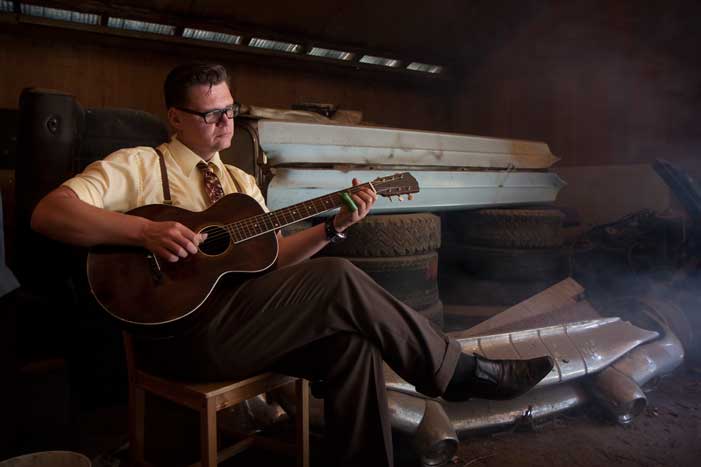Rain Likely
By David McGee
BOXCAR CAMPFIRE
Paul Pigat
Little Pig RecordsIn last month’s issue, Paul Pigat appeared in his guise as Cousin Harley on his new album It’s a Sin, dealing some fairly incendiary rockabilly, merciless rock ‘n’ roll and elegant Les Paul-styled pop. Released concurrently with It’s a Sin, Boxcar Campfire bears Pigat’s birth name, more acoustic than electric guitar, some fancy fingerpicking, a decided bent towards country and Delta blues, an atmosphere alternately laid-back and tense and some striking vocals steeped in a wry, weathered, unsentimental perspective born of experience in life its ownself. In case you didn’t get the drift, it’s also one terrific album—certainly an ideal counterpart to the fiery It’s a Sin, but in its own right a thoughtful, soulful keeper of a long player.
Seven of the dozen songs are Pigat originals and two of the other five are Pigat co-writes, so his stamp really is all over the tunes here. The concept is so artfully executed that he even makes Hank Williams’s combination train/prison song “Lonesome Whistle” his own by forsaking the dirge arrangement favored by Hank (and many others who have covered it) and opting instead for a brisk pace, chugging on down the line in a lively bluegrass arrangement featuring Paul Rigby tearing off an impressive, fleet-fingered mandolin solo, Pigat weaving some deft, circuitous runs on guitar and adding a bluesy, energetic vocal to boot. Now you have no reason ever again to listen to Phish’s version of this song, and for this we should all be thankful.
Boxcar Campfire offers a pleasing balance between dark and light moments specifically relating to men and women together (or apart, as the case may be). Within these broad parameters, Pigat offers variety aplenty. His “Dig Me a Hole” recounts the figurative burial of an unfaithful paramour’s duplicity and betrayals in a shambling arrangement heavy on sinister overtones, with Pigat’s banjo adding a taste of country and his growling vocal enhancing the lyrics’ self-lacerating recriminations in a disturbing scenario evoking comparison to some of Tom Waits’s graveyard strolls. On “Nowhere Town,” Pigat’s spare, fingerpicked acoustic guitar provides the ominous backdrop for the artist’s straightforward, understated tale of complete and utter abandonment—by friends, by a lover, even by the place he called home; another quiet, fingerpicked folk beauty, “Troubled Mind,” recounts a fellow’s leave taking in response to his own inner turmoil eating him up; in a most unusual turn of events, he wishes for his gal to be waiting for him when the prodigal returns from his wanderings; Pigat’s sturdy, unaffected singing, the sincerity of his delivery, and the tenderness emanating from his soft guitar, sell the hint of better times ahead once the (mental) fog lifts.
To these you can add a cool, ragtime-flavored salute to the salutary effects of a certain home brew, “Corn Liquor,” complete with some tasty acoustic soloing by Pigat along with an advisory about the drink’s dubious after-effects: “Corn liquor/sweeter than wine/get you there but in half the time/one little sip’ll drive your blues away/but the bottom of the bottle be the end of yo’ days/you’ll make new friends all night long/wake up in the morning all your senses are gone/so drink with caution, have a good time/ ‘cause that corn liquor blues is gonna blow your mind.” And to the legion of double-entendre upbeat blues classics centered on sweeteners (see Bessie Smith’s “A Little Sugar In My Bowl” for further reference), add Pigat’s low-down romp “Sweet Tooth,” and take special pleasure in his frisky slide guitar solo, much as he hopes the object of his affection takes to his salacious come-on.
Pigat signs off with a couple more scrumptious items: he gets charged up electrically in the grinding, stomping “Tortured,” his fuzzed-out guitar howling, his voice frayed and growling grievously about his woman bailing on him; then signs off with a winsome, ethereal “Storm Song,” a low-key rumination attributing to atmospheric disturbances his inability to re-connect with another’s heart. Barry Mirochnick’s drums clatter, but with subdued anxiety, Pigat’s guitar wails and moans, but sotto voce, the music as wary of an oncoming fury as the singer’s voice is weary of the struggle. I think it’s gonna rain today.
Founder/Publisher/Editor: David McGee
Contributing Editors: Billy Altman, Laura Fissinger, Christopher Hill, Derk Richardson
Logo Design: John Mendelsohn (www.johnmendelsohn.com)
Website Design: Kieran McGee (www.kieranmcgee.com)
Staff Photographers: Audrey Harrod (Louisville, KY; www.flickr.com/audreyharrod), Alicia Zappier (New York)
E-mail: thebluegrassspecial@gmail.com
Mailing Address: David McGee, 201 W. 85 St.—5B, New York, NY 10024



